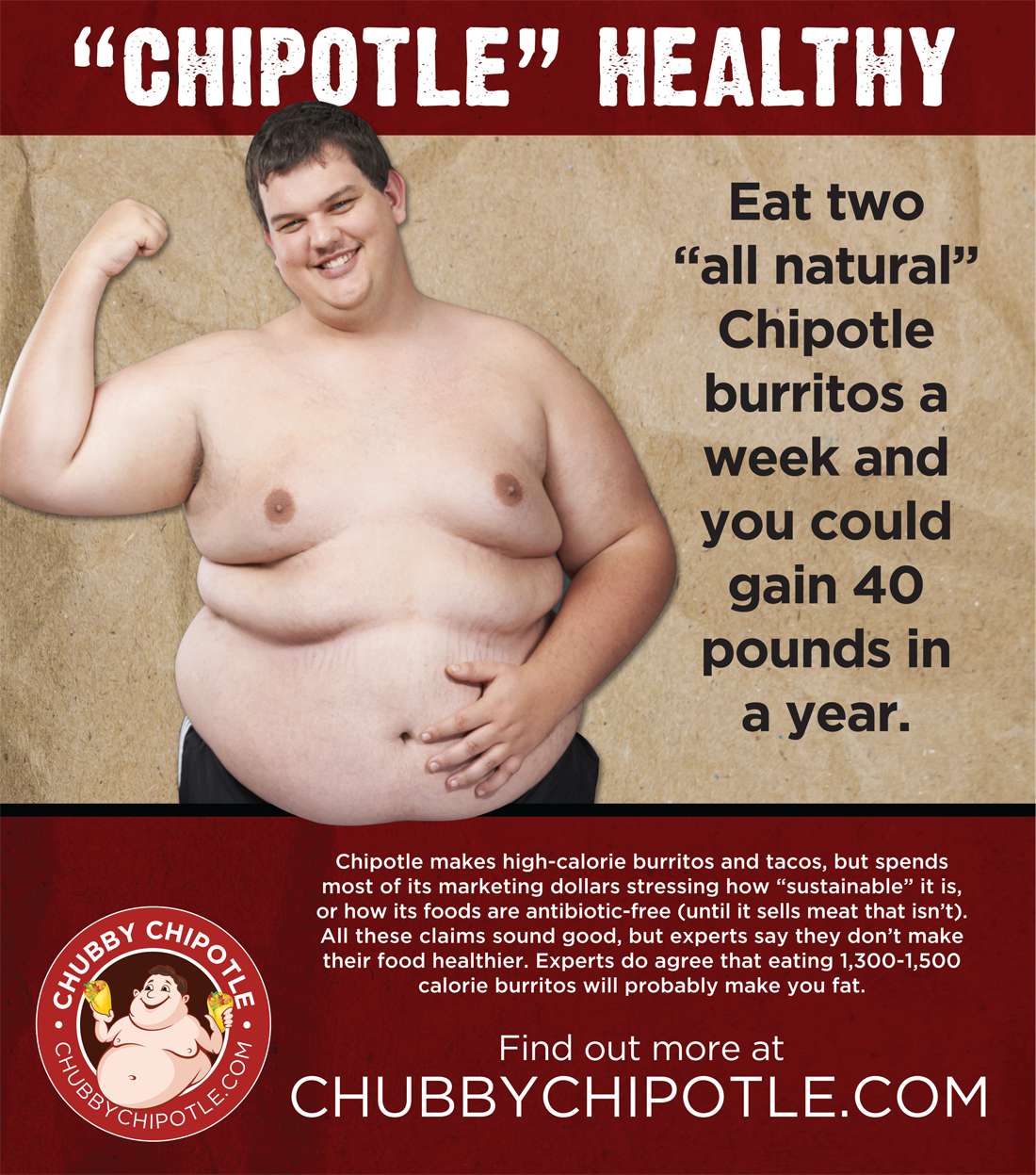This Harsh New Ad Attacks Chipotle's Health Claims

By:
A harsh, new attack ad is calling out Chipotle.
The burrito chain is accused of using deception to market high-calorie meals as healthy options.
The ad—part of a campaign funded by the Center for Consumer Freedom, an organization based in Washington, D.C., that's know to be associated with fast food companies—directs people to ChubbyChipotle.com. On Thursday, this image was printed as a full page ad in the New York Post, Business Insider reports.
The ad features a shirtless, obese man smiling next to the burrito chain's font saying, "Eat two 'all natural' Chipotle burritos a week and you could gain 40 pounds in a year."
 Chubby Chipotle - chubbychipotle.com
Chubby Chipotle - chubbychipotle.com
A typical Chipotle burrito is stuffed with some type of protein (steak, chicken, or pork), beans, rice, cheese, and guacamole and contains about 1,000 calories, according to information from the company's website. For an adult, that's about half of the recommended daily caloric intake.
"This whole thing is a ridiculous smear campaign based on inaccurate representations of our positions and orchestrated by the Center for Consumer Freedom on behalf of its unknown supporters," said Chipotle spokesman Chris Arnold. "We have always been very transparent in the way we run our business and in the challenges we face."
This year, Chipotle was forced to stop serving pork at hundreds of restaurants when it learned that one supplier was violating its animal-treatment standards. Its advertising methods, according to Chipotle's spokesman, has nothing to do with the quality of its food.
On the Chubby Chipotle site, the ad also alleges deception in Chipotle's claims about using antibiotic-free meat. The site claims that Chipotle's commitment to using antibiotic-free meat is unhealthy for animals because the medicines heals sick animals. It also says that Chipotle's aversion to GMOs is a bad thing because genetically modified organisms (GMOs) are known to be safe. As ATTN: has reported, there is no definitive scientific evidence that says GMOs are dangerous, although GMO opponents are correct that no one knows for sure.
Related: Why Chipotle is Ditching GMOs
Related: What Does Science Really Say About GMOs?
“Chipotle claims to be ethical but its ‘Food with Integrity’ marketing doesn’t have any filling. It’s an empty ploy that is highly unscientific and harms animal welfare,” said Will Coggin, director of research at the Center for Consumer Freedom, in a statement. “Considering how Chipotle ignores scientists and experts, ‘Food with Hypocrisy’ would be a more honest slogan.”
Chipotle is calling the ad a smear campaign against a company known for serving fresh ingredients and meat from only ethically treated animals.
"Chipotle has done more to influence positive change in the nation’s food system than any other restaurant company, and the claims we make about our business are honest, transparent and entirely defensible," he said. "The desperate and misdirected attacks from the less-than-forthcoming Center for Consumer Freedom won’t change that."
So what's going on here?
Rick Berman, a lobbyist "famous for arguing on behalf of big food companies and against big health initiatives," founded the Center for Consumer Freedom, the group behind the ad campaign, according to the Washington Post. Coggin told the Post that no other outside groups or companies are behind the attack.
"It's just a project of ours," he told The Post.
Chipotle is in fierce competition with fast food companies like McDonald's and Burger King. The restaurant industry has changed as consumers, seeking healthier, higher quality options, are flocking to so-called "fast casual" stores like Chipotle, Shake Shack, and Five Guys and are leaving fast food companies like McDonald's. Thus, this attack ad on on Chipotle should be also viewed in this context, with fast food companies and their advocates looking to discredit their fast casual opponents.
